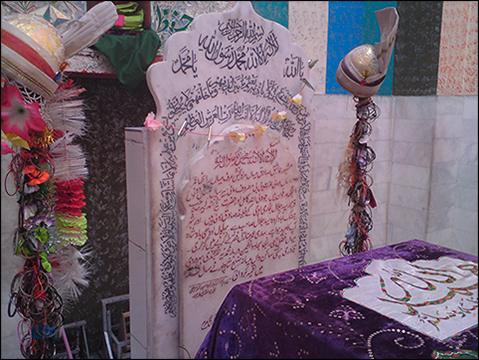66 Panjabi

Panjabi (also written Punjabi) is an Indo-Aryan language with about 125 million speakers in South Asia and beyond. With most Panjabi speakers living in the Pakistani province of Panjab and the neighboring Indian state of the same name, it also has a large diaspora of speakers all over South Asia and beyond, especially in Great Britain and Canada. Panjabi is written in the Arabic script in Pakistan and in the Gurmukhi script in India.
With beginnings in the 13th century, one striking feature of Panjabi literature is the large number of ballads of unrequited love. Of these, few have been as popular as the love story of Hir and Ranjha, often just referred to as Hir (pronounced as Heer), whose tragic love story was given poetic form by a number of poets through the centuries.
Dhaidu Ranjha was the youngest and handsomest of eight brothers and two sisters. He was the spoilt darling of his parents which made his older brothers jealous. On the death of the parents the brothers divided up the farmland among themselves giving Ranjha the worst fields. Matters were made worse by the hostility of Ranjha’s sisters-in-law, who were fed up with the young women of the village swooning over their good-for-nothing brother-in-law. During an argument over food one day they insulted and taunted him and dared him to marry Hir, the beautiful daughter of the powerful Sial clan, if he had such a high opinion of himself.
Ranjha left his house in a huff vowing never to return and traveled all day until he was dead tired. He came across a throne in a beautiful garden and stretched himself on it and went to sleep. He was soon awakened by an indignant but radiantly beautiful young woman and her pretty companions. This was none other than Hir who angrily wanted to know why this stranger was sleeping on her throne in her private garden. However, when a few words were exchanged it was love at first sight for both of them. Ranjha decided to become a herdsman of Hir’s family’s water buffaloes in order to stay near her.
Hir’s family soon found out about their secret meetings and decided to marry her off into the Khera family that belonged to another powerful clan of the region. Hir and Ranjha were devastated and Ranjha, having decided to renounce the world, went to the monastery of Bal Nath, a master of the Nath sect of yogis and became a disciple. He began wandering as a mendicant only one day to knock on the door of Hir’s in-laws. The lovers resumed their secret trysts only to be found out again. This time the scandal was even bigger and more dangerous as the honor of two powerful clans was involved. Nevertheless, Hir’s family reluctantly agreed to allow Hir and Ranjha to marry. However Kaido, Hir’s maternal uncle could not bear the dishonor brought to the family, and on the day of the wedding killed Hir by making her eat a poisoned confection. When Ranjha came to the house and saw what had happened he immediately ate the rest of the poisoned confection at last uniting with his beloved in death if not in life.
The earliest extant version of Hir was composed by the poet Damodar (1486-1568) in the early 16th century. Other versions were produced by various poets over the centuries yet few reached the fame and popularity of Waris Shah’s version which continues to be sung and enjoyed to this day.
Born in 1722 in the town of Jandiala Sher Khan in present-day Pakistan, Waris Shah (also spelled Vāris̲ Shāh and Warisa Shaha) became the disciple of Hafiz Ghulam Murtaza, a Qadiri-Chisti Sufi master from the city of Qasur. After completing his education, Waris Shah settled in the village of Malka Hans, where according to tradition in 1766 Waris Shah wrote his version of Hir after his own experience of unrequited love. The beautiful language and refined sentiments of Waris Shah’s Hir made it an instant success, especially among Sufi and other religious circles who saw it as an allegory of the mystical path of spiritual realization and the soul’s yearning for union with the divine. One interesting feature of Waris Shah’s Hir is a detailed and appreciative description of the spiritual traditions of the Nath yogis highlighting the ecumenical vision of Waris Shah and his belief in the universality of love and its spiritual grace. It was for this reason that during the Partition riots of 1947 when the famous contemporary poet Amrita Preetam left her hometown of Lahore on a train heading to Delhi, she composed a poem of lament addressed to Waris Shah asking him to look at his strife-torn Panjab and open another page of the book of love.
As for Hir and Ranjha, while historians may doubt their existence the tomb in which both are reputedly buried continues to be a destination for star-crossed lovers, Sufi and other spiritual aspirants, and all those drawn to the grace of love.
UC Berkeley has offered instruction in Panjabi since the 1980s where introductory and intermediate Panjabi is taught in the Department of South & Southeast Asian Studies. The current Panjabi instructor is Ms. Upkar Ubhi who has been teaching Panjabi on campus since 1998.
Contribution by Adnan Malik
Curator and Cataloger for the South Asia Collection
South/Southeast Asia Library
Title in English: The Adventures ofHir and Ranjha
Authors: Vāris̲ Shāh, 1722–1798.
Imprint: n/a
Edition: n/a
Language: Panjabi
Language Family: Indo-European, Indo-Aryan
Source: Punjabi Kavita
URL: https://www.punjabi-kavita.com/Waris-Shah.php
Other online editions:
- The Adventures ofHir and Ranjha translated in to English by Charles Frederick Usborne, 1874–1919. (University of Heidelberg)
Select print editions at Berkeley:
- Hīra / Wārasashāha. Ammritasara: Bhāī Catara Siṅgha Jīwana Siṅgha, [19–]. In Panjabi (Gurmukhi script).
- Hīr Vāris̲ Shāh / Faqīr Muḥammad Faqīr; mushkil lafẓāṉ da tarjamah, Sult̤ān Khārvī. Lāhaur: Taḵẖlīqāt, 2012. In Panjabi (Arabic script).

